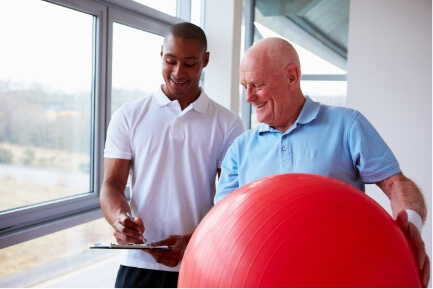Did you know that back pain is the highest reported area of pain across the United States? Chronic back pain is one of the most common reasons that people seek physical therapy treatment. 60-80% of people will experience back ailments of some sort in their lives, and it may likely be caused by a herniated disc.
A herniated disc can develop anywhere along one’s spine but it most commonly occurs in the lower back. The pain can range in severity, but our licensed physical therapists can help you find quick relief. If you are looking for a natural, easy, and effective way to manage your back pain, schedule a consultation with us today!
How do herniated discs occur?
Spinal discs are soft and rubbery pads located between the bony vertebrae that help make up the spinal column. They are made of a thick outer ring of cartilage and an inner gel-like substance, designed to also work as shock absorbers. Your spinal discs also work to allow the back to bend with ease and they help protect your spinal cord and the delicate nerves on your back.
If the cartilage in your spinal disc somehow tears or develops a defect, the inner gel-like substance, also known as the “nucleus,” can breakthrough. This bulging or herniation can then put pressure on the nerves, resulting in intense pain. Even small amounts of pressure on your spinal nerves can cause pain, numbness, or weakness.
Herniated discs in the lower back can be particularly painful because they put pressure on the sciatic nerve, which can result in sciatica. The sciatic nerve is made up of several spinal nerve branches that travel from the spine down to the leg. If the sciatic nerve becomes pinched, pain can radiate from the buttocks area, down throughout the back of the leg, and into the shin and foot. Luckily, physical therapy can work to reduce the pain caused by this condition.
When you are young, your spinal discs have a high water content level, made up of almost 80% water. However, as you age, the water content in your spinal discs lowers. This causes the discs to become less pliable, thus increasing the risk of tears or other defects. Some of the other common causes of herniated discs include:
- Repetitive twisting movements.
- Heavy or incorrect lifting.
- Traumatic injury.
- High-impact sports.
- Excessive body weight or obesity.
How do I know if I have a herniated disc?
Symptoms associated with a herniated disc may vary, depending on where the injured disc is located. Some of the most common symptoms people also experience with a herniated disc include:
- Pain that intensifies when bending, sitting, coughing, or sneezing.
- Weakness in the legs.
- Pain when bending or twisting.
- Numbness, tingling, or burning in the back, buttock, legs, and/or feet.
If you are experiencing any or all of these symptoms, you may have a herniated disc. Fortunately, physical therapy can help relieve pain due to a herniated disc or any other back issues. We recommend scheduling a consultation with one of our physical therapists as soon as possible, to treat the pain before it intensifies.
Relieve your back pain with physical therapy:
Physical therapy is non-invasive, safe, and successful in treating patients living with back pain. You will meet our expert physiotherapists. They are highly trained in specific methods and modalities. These will alleviate your pain, stimulate blood flow, reduce your inflammation, and restore your range of motion.
Schedule your consultation today for an effective way to recover from whatever condition may be causing your pain. Your back will be happy you did!
Sources:
https://www.moveforwardpt.com/SymptomsConditionsDetail.aspx?cid=79ef56df-780e-4ad0-963f-94364404125a




